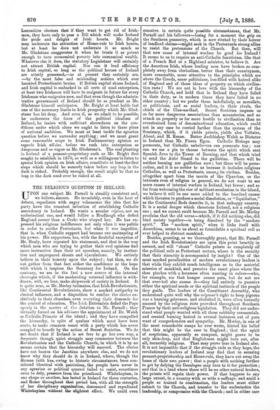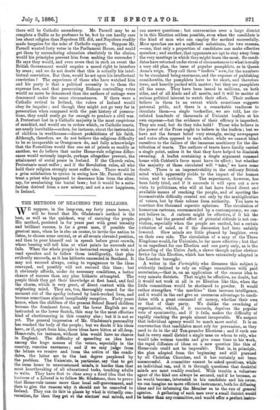THE RELIGIOUS QUESTION IN IRELAND.
UPON one subject Mr. Parnell is steadily consistent and, we believe, sincere. He invariably, even in the heat of debate, repudiates with angry vehemence the idea that his party have the remotest intention of establishing Catholic ascendency in Ireland. He wants a secular regime, not an ecclesiastical one, and would follow a Bradlaugh who defied England sooner than a Croke who obeyed her. He has ex- pressed his religious indifference not only when it was politic in order to soothe Protestants, but when it was impolitic, that is, when Catholic support had become one mainspring of his power. His supporters, too, with the doubtful exception of Mr. Healy, have repeated his statement, and that in the way which men who are trying to gather their real opinions find more instructive than their set speeches, namely, by instinc- tive and unprepared shouts and ejaculations. We entirely believe in their honesty upon the subject ; but then, we do not gather from that fact either the confidence or the hope with which it inspires the Secretary for Ireland. On the contrary, we see in the fact a new source of the internal cleavages which, if the moderating external influence is with- drawn, will, we fear, make shipwreck of society in Ireland. It is quite true, as Mr. Morley intimates, that Irish Revolutionists, like Continental Revolutionists, show a marked antipathy to clerical influence, and a disposition to confine the clerics ex- chigively to their churches, even resenting their demands for the control of education. The Irish Extremists defied the Pope openly in the matter of the dotation to Mr. Parnell ; they virtually forced on his advisers the appointment of Dr. Walsh as Catholic Primate of the island ; and they have compelled the hierarchy, in spite of qualms which must have been acute, to make common cause with a party which has never scrupled to benefit by the action of Secret Societies. We do not doubt that if Ireland is set free to go her own way, a desperate though quiet struggle may commence between the -Revolutionists and the Catholic Church, in which it is by no means certain that the hierarchy will succeed. The clerics have not beaten the Jacobins anywhere else, and we do not know why they should do it in Ireland, where, though the Roman faith has, owing to historic circumstances, been con- sidered identical with patriotism, the people have never in any agrarian or political quarrel failed to resist, sometimes even to defy, pressure from the priesthood. Whiteboyism, in one shape or another, has lasted in Ireland for three centuries, and Rome throughout that period has, with all the strength of her disciplinary organisation, denounced and repudiated Whiteboyism without the slightest effect. We could even conceive, in certain quite possible circumstances, that Mr. Parnell and his followers—losing for a moment the grip on the Southern peasantry, which is now riveted by their horror of landlord claims—might seek in the Protestants strong allies to resist the pretensions of the Church. But then, will that new cause of internal warfare be good for Ireland I It seems to us to require an anti-Catholic fanaticism, like that of a French Red or a Highland minister, to believe it. Are the American Irish, whose leading men have broken so com- pletely away from clericalism, better than their countrymen, more reasonable, more attentive to the principles which are above the Creeds, saner politicians, less filled with hatred alike of England and of those ideas of property on which civilisa- tion rests ? We are not in love with the hierarchy of the Catholic Church, and hold that in Ireland they have failed in their duty, as in modern times they have failed in no other country ; but we prefer them indefinitely, as moralists, as politicians, and as social leaders, to their rivals, the chiefs of the Clan-na-Gael. Secret Societies impress us as far more dangerous associations than monasteries, and an attack on property as far more hostile to civilisation than an overstrained form of denominational education, which could not in any case be carried farther than the system of the Seminary, which, if it yields priests, yields also Voltaire, About, and M. Renan. Better Archbishop Walsh as Dictator in Ireland than Mr. Pierce Egan. Catholic Bishops may persecute, but Catholic unbelievers can persecute too ; nor can we see a pin to choose between the spirit which sent Spanish Jews to the Tower of Burning, and that which tried to send the Abbe Sicard to the guillotine. There will be neither burning nor guillotine now ; but there will be perse- cution, and it is no nobler to us because it includes religious Catholics, as well as Protestants, among its victims. Besides, altogether apart from the merits of the Churches, or the interests even of religion in general, we do not want to see more causes of internal warfare in Ireland, but fewer • and so far from welcoming the rise of militant secularism in the island, we believe it will be one more added to the hundred causes which threaten to produce a social dissolution, or "liquidation," as the Continental Reds describe it, in that unhappy country. It is a social danger which threatens Ireland, not a religious one ; and we cannot exult because Mr. Parnell and Mr. Morley proclaim that the old nexus—which, if it did nothing else, did bind society together—is being dissolved by the " modern spirit." The " modern spirit," when it links itself with Anarchism, seems to us about as formidable a spiritual evil as ever helped to distract mankind.
Besides, granting, as we thoroughly grant, that Mr. Parnell and the hish Revolutionists are upon this point heartily in earnest, and will "shunt " Catholic priests as completely off the political rails as Protestant rectors, where is the security that their sincerity is accompanied by insight ? One of the most marked peculiarities of modem revolutionary leaders is that while they exhibit much intelligence as to the material miseries of mankind, and perceive the exact place where the shoe pinches with a keenness often wanting in rulers—who, for example, see that hunger causes pain, but do not see that over-toil also causes it—they fail entirely to perceive either the spiritual needs or the spiritual instincts of the people they guide. The leaders of the Constituent Assembly, who understood quite well why the seigneur's right to keep pigeons was a burning grievance, and abolished it, were often honestly amazed by the religious riots provoked throughout Southern France by their anti-religious legislation. They did not under- stand what people wanted with all those rubbishy ceremonials, and created burning hatred in several instances out of pure want of comprehension and sympathy. Mr. Morley, in one of the most remarkable essays he ever wrote, hinted his belief that this might be the case in England ; that the spirit of scepticism, apparently so rampant, might prove to be only skin-deep, and that Englishmen might turn out, after all, incurably religious. That may prove true in Ireland also. It is not impossible that if the struggle ends as they hope, the revolutionary leaders of Ireland may find that in securing peasant-proprietorship and Home-rule, they have cut away the bases of their own power; that a people with nothing further to get by defying the Decalogue may turn to it for protection ; and that in a land where there will be no other natural leaders, the priests will regain their power. If that happens to any large extent, in a country with so wide a suffrage, and amid a people so trained to combination, the leaders must either submit to the Church, and transfer to the ecclesiastics the leadership, or compromise with the Church ; and in either case
there will be Catholic ascendency. Mr. Parnell may be as complete a Gallio as he professes to be, but he can hardly care less about religion than Napoleon III. did, and Napoleon readily made bargains for the sake of Catholic support. Suppose Mr. Parnell wanted forty votes in the Parliament House, and could get them by surrendering education absolutely to the clerics, would his principles prevent him from making the surrender ? He says they would, and even avers that in such an event the British Government would acquire a moral right to interfere by arms ; and we do not doubt that this is actually his intel- lectual conviction. But then, would he act upon his intellectual conviction ? The experience of those who have watched him and his party is that a political necessity is to them the supreme law, and that persecuting Bishops controlling votes would no more be denounced than the authors of outrage were denounced under the same circumstances. If there were a Catholic revival in Ireland, the rulers of Ireland would obey its impulse ; and though they might not go very far in persecution when compared with the past history of persecu- tions, they could easily go far enough to produce a civil war. A Protestant lost in a Catholic majority is the most suspicious of mankind, and would see in orders which, on Catholic tenets, are nearly inevitable—orders, for instance, about the instruction of children in workhouses—direct prohibitions of his faith. Although, therefore, we do not believe the religious difficulty to be so insuperable as Orangemen do, and fully acknowledge that the Parnellites would fine one set of priests as readily as another, we do believe that under Home-rule religious differ- ences would seriously impede, perhaps altogether prevent, the attainment of social peace in Ireland. If the Church rules, Protestants must suffer ; and if the Revolution rules, all who hold their religion strongly must suffer also. There would be a grim satisfaction to cynics in seeing how Mr. Parnell would treat a priest who happened to denounce him from the altar, say, for secularising the burial laws ; but it would be a satis- faction derived from a new misery, and not a new happiness, in Ireland.



































 Previous page
Previous page